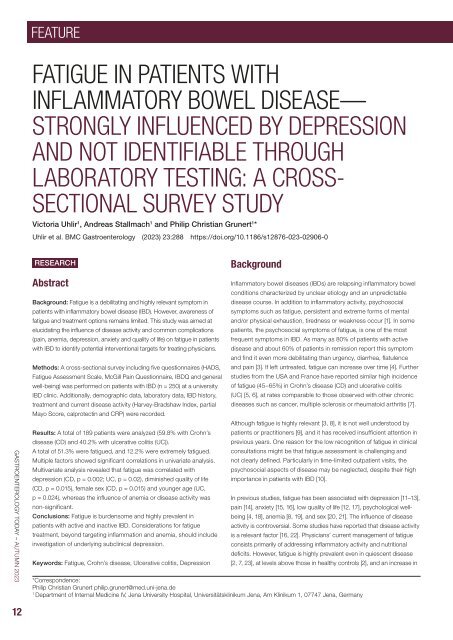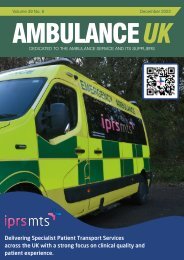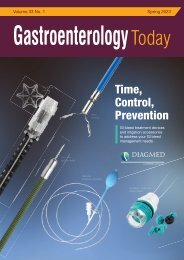Gastroenterology Today Autumn 2023
Gastroenterology Today Autumn 2023
Gastroenterology Today Autumn 2023
Create successful ePaper yourself
Turn your PDF publications into a flip-book with our unique Google optimized e-Paper software.
FEATURE<br />
FATIGUE IN PATIENTS WITH<br />
INFLAMMATORY BOWEL DISEASE—<br />
STRONGLY INFLUENCED BY DEPRESSION<br />
AND NOT IDENTIFIABLE THROUGH<br />
LABORATORY TESTING: A CROSS-<br />
SECTIONAL SURVEY STUDY<br />
Victoria Uhlir 1 , Andreas Stallmach 1 and Philip Christian Grunert 1 *<br />
Uhlir et al. BMC <strong>Gastroenterology</strong> (<strong>2023</strong>) 23:288 https://doi.org/10.1186/s12876-023-02906-0<br />
RESEARCH<br />
Background<br />
GASTROENTEROLOGY TODAY – AUTUMN <strong>2023</strong><br />
Abstract<br />
Background: Fatigue is a debilitating and highly relevant symptom in<br />
patients with inflammatory bowel disease (IBD). However, awareness of<br />
fatigue and treatment options remains limited. This study was aimed at<br />
elucidating the influence of disease activity and common complications<br />
(pain, anemia, depression, anxiety and quality of life) on fatigue in patients<br />
with IBD to identify potential interventional targets for treating physicians.<br />
Methods: A cross-sectional survey including five questionnaires (HADS,<br />
Fatigue Assessment Scale, McGill Pain Questionnaire, IBDQ and general<br />
well-being) was performed on patients with IBD (n = 250) at a university<br />
IBD clinic. Additionally, demographic data, laboratory data, IBD history,<br />
treatment and current disease activity (Harvey-Bradshaw Index, partial<br />
Mayo Score, calprotectin and CRP) were recorded.<br />
Results: A total of 189 patients were analyzed (59.8% with Crohn’s<br />
disease (CD) and 40.2% with ulcerative colitis (UC)).<br />
A total of 51.3% were fatigued, and 12.2% were extremely fatigued.<br />
Multiple factors showed significant correlations in univariate analysis.<br />
Multivariate analysis revealed that fatigue was correlated with<br />
depression (CD, p = 0.002; UC, p = 0.02), diminished quality of life<br />
(CD, p = 0.015), female sex (CD, p = 0.015) and younger age (UC,<br />
p = 0.024), whereas the influence of anemia or disease activity was<br />
non-significant.<br />
Conclusions: Fatigue is burdensome and highly prevalent in<br />
patients with active and inactive IBD. Considerations for fatigue<br />
treatment, beyond targeting inflammation and anemia, should include<br />
investigation of underlying subclinical depression.<br />
Keywords: Fatigue, Crohn’s disease, Ulcerative colitis, Depression<br />
Inflammatory bowel diseases (IBDs) are relapsing inflammatory bowel<br />
conditions characterized by unclear etiology and an unpredictable<br />
disease course. In addition to inflammatory activity, psychosocial<br />
symptoms such as fatigue, persistent and extreme forms of mental<br />
and/or physical exhaustion, tiredness or weakness occur [1]. In some<br />
patients, the psychosocial symptoms of fatigue, is one of the most<br />
frequent symptoms in IBD. As many as 80% of patients with active<br />
disease and about 60% of patients in remission report this symptom<br />
and find it even more debilitating than urgency, diarrhea, flatulence<br />
and pain [3]. If left untreated, fatigue can increase over time [4]. Further<br />
studies from the USA and France have reported similar high incidence<br />
of fatigue (45–65%) in Crohn’s disease (CD) and ulcerative colitis<br />
(UC) [5, 6], at rates comparable to those observed with other chronic<br />
diseases such as cancer, multiple sclerosis or rheumatoid arthritis [7].<br />
Although fatigue is highly relevant [3, 8], it is not well understood by<br />
patients or practitioners [9], and it has received insufficient attention in<br />
previous years. One reason for the low recognition of fatigue in clinical<br />
consultations might be that fatigue assessment is challenging and<br />
not clearly defined. Particularly in time-limited outpatient visits, the<br />
psychosocial aspects of disease may be neglected, despite their high<br />
importance in patients with IBD [10].<br />
In previous studies, fatigue has been associated with depression [11–13],<br />
pain [14], anxiety [15, 16], low quality of life [12, 17], psychological wellbeing<br />
[4, 18], anemia [8, 19], and sex [20, 21]. The influence of disease<br />
activity is controversial. Some studies have reported that disease activity<br />
is a relevant factor [16, 22]. Physicians’ current management of fatigue<br />
consists primarily of addressing inflammatory activity and nutritional<br />
deficits. However, fatigue is highly prevalent even in quiescent disease<br />
[2, 7, 23], at levels above those in healthy controls [2], and an increase in<br />
*Correspondence:<br />
Philip Christian Grunert philip.grunert@med.uni-jena.de<br />
1<br />
Department of Internal Medicine IV, Jena University Hospital, Universitätsklinikum Jena, Am Klinikum 1, 07747 Jena, Germany<br />
12
















